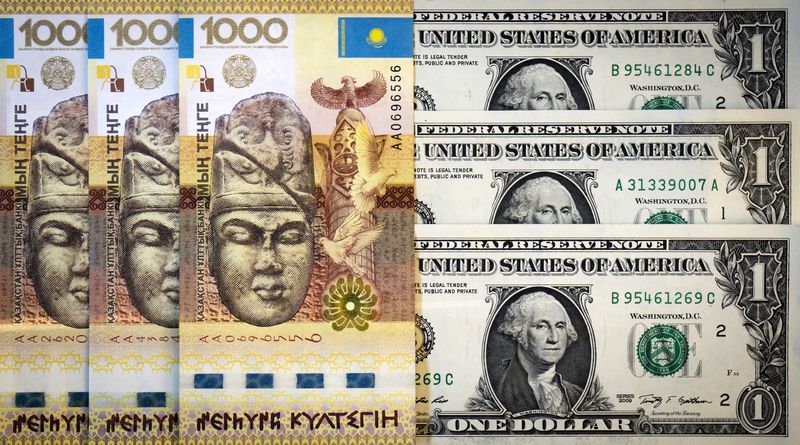By Sujata Rao
LONDON (Reuters) - Plunging commodity prices are testing the viability of emerging currencies' long-standing pegs to the dollar, with some already abandoned as countries balk at the cost of clinging to fixed exchange rates.
Kazakhstan unshackled its tenge last week, and bets are growing that from Hong Kong to Saudi Arabia, dollar pegs are at risk.
"Markets are now questioning the sustainability of other dollar pegs, wondering which will be the next domino to fall," Deutsche Bank (XETRA:DBKGn) told clients.
A peg fixes the value of one currency relative to another and uses central bank reserves to enforce the relationship. Pegs are relatively rare these days among the bigger economies, partly because of the 1997-2002 emerging market crises that were exacerbated by the cost of clinging to fixed exchange rates.
Kazakhstan's tenge has fallen 30 percent
Russia ended its own flexible or "crawling" peg to the dollar after burning billions of dollars in reserves to defend the rouble
Now pressure is mounting on others, especially "petro-pegs" such as in Azerbaijan, Saudi Arabia and Nigeria.
Justifying the cost of clinging to them will become increasingly difficult for those reliant on commodities and exposed to China's weakening economy, says Simon Quijano-Evans, chief EM strategist at Commerzbank (XETRA:CBKG).
That's especially so as commodity exporters with flexible exchange rates such as Brazil and South Africa start to benefit from their currencies' 10-20 percent depreciation this year.
Dollar pegs made some sense for countries whose revenues, either from tourism as in the Caribbean or from oil as in the Gulf, are mainly in dollars, especially when commodity prices were high and the dollar was weak.
Now the opposite is true.
"Your economy is going to suffer if your main trade partner is suffering and you cannot allow your currency to adjust while other countries are adjusting theirs," Quijano-Evans said.
China this month devalued the yuan, widened its trading band to the dollar and pledged to give markets a greater say in setting daily exchange rates. The yuan's 3 percent fall since then
Mindful of past crises, policymakers will be reluctant to sharply run down reserves to support overvalued currencies.
What's more, the investment flows and export revenues that fed reserve growth are dwindling and current account surpluses have almost vanished.
"Pegs are sustainable only as long as you run a big current account surplus and there are inflows that allow central banks to support their currencies," said Cristian Maggio, a strategist at TD Securities.
OVERVALUED
The tenge may provide a clue as to who is next. It looked overvalued prior to its float, standing 11 percent above its average over the decade, Deutsche Bank calculated.
By this measure, Deutsche says, four currencies appear overvalued: the Saudi riyal, the United Arab Emirates dirham, the Nigerian naira and the Egyptian pound, all of them tied to the dollar via "hard" or soft, flexible pegs.
Analysts see the naira and pound as vulnerable, because both countries have limited reserves and are keeping official exchange rates steady only by rationing hard currency. Both have weakened in parallel markets
Traders meanwhile are testing Gulf central banks' by pushing currencies down in forward markets - one-year dollar-riyal forwards for instance are at 12-year highs
Saudi reserves of $660 billion mean the authorities can easily defend its 30-year old peg for years, though prolonged oil weakness and rising U.S. interest rates will seriously squeeze finances.
"You have to distinguish between willingness and the ability (to defend pegs). Saudi, Qatar and UAE have a real safety net, far stronger than in African and some (ex-Soviet) countries," said Michael Bolliger, head of EM asset allocation at UBS Wealth Management.
Venezuela, Angola and Algeria, oil producers with managed currencies and lacking deep pockets, are also facing pressure.
Pegs to the euro have been tested too, including the Danish crown's three-decade-old link (EURDKK=), after Switzerland scrapped its exchange rate cap in January. The difference here is that pressure has been upward, with central banks forced to buy euros to hold the pegs.

Similar bets are now evident against the Hong Kong dollar's peg to the greenback. But while Hong Kong may suffer from China's slowdown, it still enjoys large capital inflows, imports energy and has seen reserves rise by $12 billion this year. Few therefore expect it to lose its peg.